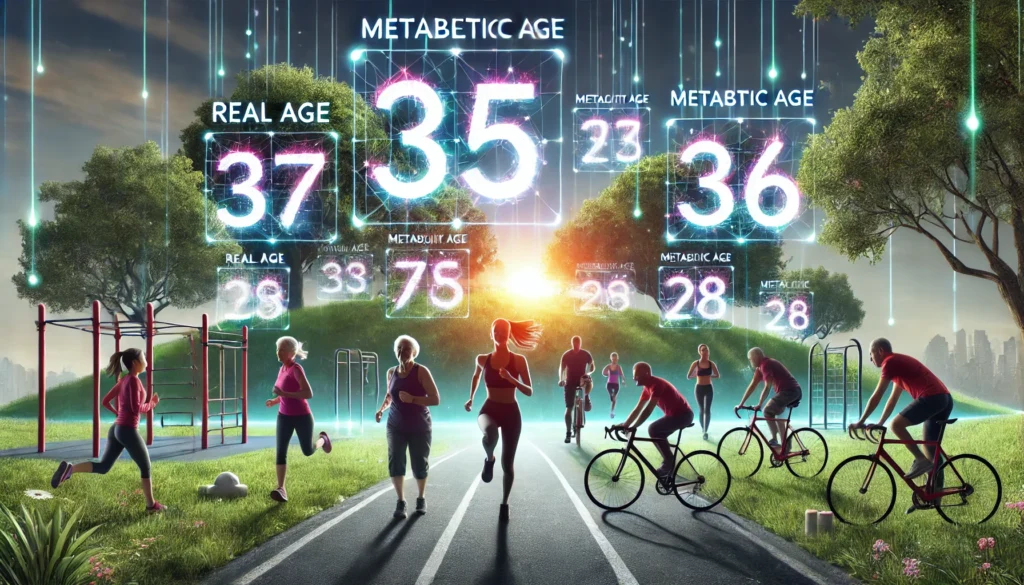Age is just a number, but what if your body’s true age is different from your actual years? That’s where a metabolic age calculator comes in. It helps determine how efficiently your body burns energy compared to others in your age group. If your metabolic age is lower than your actual age, your body functions younger; if it’s higher, it may indicate poor metabolic health.
Understanding your metabolic age can help you adjust your lifestyle, diet, and exercise routine to optimize your health and longevity. In this guide, we’ll break down what metabolic age is, how it’s calculated, why it matters, and how you can improve it.
What Is Metabolic Age?
Metabolic age is a comparison of your Basal Metabolic Rate (BMR) to the average BMR of people in your age group. BMR is the number of calories your body needs at rest to maintain basic functions like breathing, circulation, and cell production.
For example, if your metabolic age is 30, but your actual age is 40, it means your metabolism is functioning like that of a 30-year-old. Conversely, if your metabolic age is 50 and you are 40, it suggests your metabolism is slower than average.
Factors Affecting Metabolic Age:
- Muscle Mass – More muscle increases calorie burn.
- Fat Percentage – Higher fat levels slow metabolism.
- Diet and Nutrition – Poor nutrition can lead to a sluggish metabolism.
- Activity Levels – Exercise keeps metabolism high.
- Genetics – Some people naturally have faster metabolisms.
- Hormonal Balance – Thyroid function, insulin levels, and other hormones impact metabolism.
How Is Metabolic Age Calculated?
A metabolic age calculator uses your Basal Metabolic Rate (BMR), which is influenced by your weight, height, age, gender, and body composition. The formula for BMR is:
For Men:
BMR = 88.36 + (13.4 × weight in kg) + (4.8 × height in cm) – (5.7 × age in years)
For Women:
BMR = 447.6 + (9.2 × weight in kg) + (3.1 × height in cm) – (4.3 × age in years)
Once your BMR is calculated, it’s compared to standard BMR values for your age group. If your BMR is higher, your metabolic age will be lower, and vice versa.
Online Metabolic Age Calculators
You can use online metabolic age calculators that automatically compute your metabolic age based on your BMR and average BMR values for different age groups.
Why Does Metabolic Age Matter?
Your metabolic age is an indicator of overall health and fitness levels. If your metabolic age is higher than your actual age, it could suggest:
- A higher risk of weight gain due to a slower metabolism.
- Increased chances of chronic diseases like diabetes and heart disease.
- Possible muscle loss and decreased physical performance.
- Lower energy levels and sluggishness.
On the other hand, a lower metabolic age indicates:
- Efficient calorie burning, making it easier to maintain a healthy weight.
- A stronger metabolism, leading to better digestion and energy levels.
- A lower risk of metabolic disorders.
How to Improve Your Metabolic Age
1. Increase Muscle Mass
Muscle burns more calories than fat, even when you’re at rest. To build muscle:
- Incorporate strength training (lifting weights, resistance bands, bodyweight exercises) at least 3–4 times per week.
- Eat a high-protein diet to support muscle growth and repair.
2. Eat a Metabolism-Boosting Diet
Your diet plays a critical role in your metabolic age. Follow these tips:
- Eat enough protein (chicken, fish, eggs, beans) to boost metabolism and muscle recovery.
- Stay hydrated – water is essential for metabolic functions.
- Avoid processed foods that slow down metabolism.
- Eat small, frequent meals to keep your metabolism active.
3. Engage in High-Intensity Workouts
Cardio and strength training help increase metabolic rate. Try:
- High-Intensity Interval Training (HIIT) – short bursts of intense activity followed by rest.
- Regular cardiovascular exercise like running, swimming, and cycling.
4. Get Enough Sleep
Lack of sleep can slow metabolism and increase hunger hormones, leading to weight gain. Aim for at least 7–9 hours of quality sleep per night.
5. Manage Stress Levels
Chronic stress increases cortisol, which can lead to fat storage and slow metabolism. Manage stress through:
- Meditation and deep breathing.
- Yoga or light stretching.
- Regular physical activity.
6. Keep Your Hormones in Check
Hormonal imbalances, especially related to thyroid function, insulin, and cortisol, can affect metabolic age. Consult a doctor if you suspect a hormonal imbalance.
7. Stay Active Throughout the Day
A sedentary lifestyle contributes to a slow metabolism. Make small changes like:
- Taking the stairs instead of the elevator.
- Walking 10,000 steps daily.
- Standing instead of sitting for long periods.
Conclusion
Your metabolic age is a strong indicator of your body’s overall efficiency in burning calories and maintaining energy levels. While genetics play a role, your lifestyle choices have the biggest impact. By incorporating strength training, eating a balanced diet, staying active, and managing stress, you can lower your metabolic age and improve your overall health.
Want to know your metabolic age? Try an online metabolic age calculator, track your progress, and make adjustments to achieve a healthier body!


